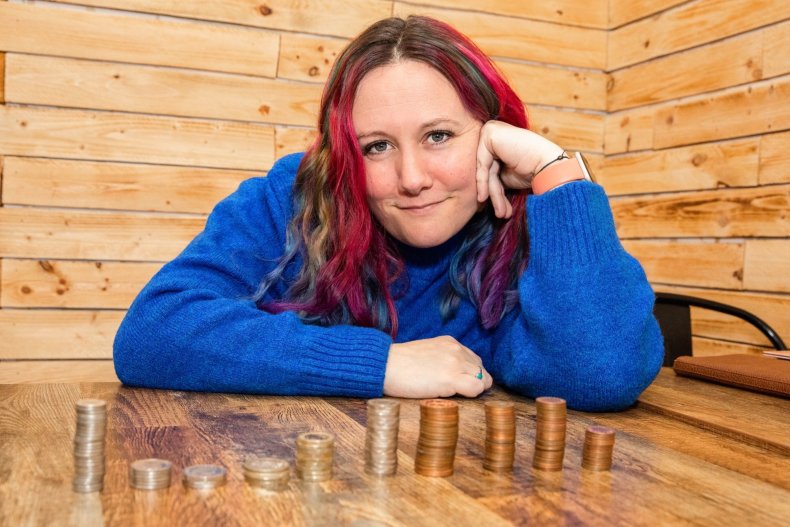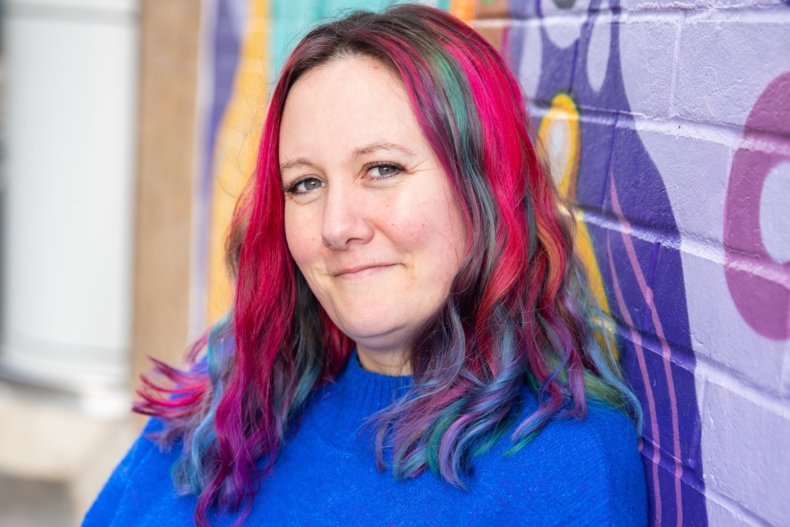‘I Was $49,000 in Debt, I Lived on $18 a Week to Turn My Life Around’
Before college, I was good at managing my finances. I worked two jobs; a window sales place and a pub, which I loved. My mom always told me that every penny counts and my parents advised me not to get a credit card, but they never really said why.
In September 2002, I went to college. On the first day, I met my new housemates in my halls of residence. They asked me if I was going to the freshers’ fair. I had no idea what it was, but I was told that I would get lots of free stuff, which sounded exciting.
At the fair, I was met with several different banks and credit card companies targeting students by offering free stuff like vouchers for pizza and supermarkets. I signed up for them all; their incentives hooked me in and I thought that I would never have to use those credit cards.

Maddy Alexander-Grout
Realizing that I had a spending problem
As the term progressed, I became depressed and homesick. I also had some problems with my flatmates. I felt like I didn’t fit in and didn’t know who I was, so I began shopping to make myself feel better. I shopped every single day and bought things just for the sake of buying them.
I bought handbags, shoes, and dresses, and I went out every night. I had a fear of missing out, so if somebody said that there was an event happening, I was the person who was there until the very end. I’d also always get taxis home because I wanted to be safe. I spent the $3,694 that I’d taken with me to college incredibly quickly.
Six weeks into college, after I’d paid my rent and my bills, I had roughly $80 left to last me for the whole term. I spent that within two days on fast food and social events. Then I dipped into my overdrafts. When I maxed them out, I used the credit cards.
Soon enough, the bills kept coming in and I had minimum payments on all my credit cards which I couldn’t afford because I had so many of them. Altogether, I had three overdrafts and six credit cards, which totaled over $1,000 in minimum payments. Nobody had taught me how to manage debt.
In 2022, I was diagnosed with attention deficit hyperactivity disorder (ADHD). In hindsight, I realized my spending addiction had developed was because I was searching for dopamine. I’d get a massive rush from going out, shopping, and spending loads of money, but then I’d come home and I’d feel very low about it. So, the cycle of buying more things to have another dopamine boost continued.
I felt the only time I was genuinely happy was spending money or in a pub drinking.
In my first year of college, I spent $30,676. In my second, $42,947. I felt so ashamed and guilty. I tried to hide it from people as much as possible. I remember hiding my post under my doormat, and I lied to my flatmates about my situation.
During that time, I became so wrapped up in working at the radio station—it was my dream to become a presenter—that I failed my degree. I felt like I had gotten into a lot of debt for no reason. I ended up staying in college for four years without a degree, pretending that I was a student because I really liked the college lifestyle.
I was very ashamed that I’d been kicked off my course. I also didn’t want to tell my mom that I had failed college. I developed glandular fever, which gave me post-viral fatigue. I couldn’t work because I was exhausted, so I couldn’t pay off any of my debts.
I was just pretending to be a student, living a high life, and not really doing much other than partying.
At the time, my boyfriend and I were living in a gritty flat. Our rent was due and we couldn’t afford it, so we packed up our bags and moved into his mom’s house. In 2006, I was $49,000 in debt. I ran away, thinking that nobody would find me.

Maddy Alexander-Grout
Hiding from all of my debt
When I moved, I got myself a job as a call center worker. It felt good to be working, but I also made new friends which came with a social life that I didn’t have time for.
Two years later, I split from my boyfriend and moved back to my hometown. It was then that I told my mom that I had failed college and about all of my debt.
Disappointed is an understatement to describe her reaction. She was very angry with me for getting me into a terrible situation. A part of me thought that she would bail me out and help cover my debt. But instead, she told me to go to citizens’ services and crisis management.
She didn’t give me any handouts, which was the best thing for me. At the time, it felt like it was the worst thing because I was going through something very horrible, and I felt alone. There weren’t many debt charities available like there are today, so I didn’t know who to talk to.
In 2008, I sought advice. I was told that I had two options: To declare myself bankrupt or to go on a debt management plan. The idea of going bankrupt filled me with dread and shame. I remember thinking: “I’m not going to be able to do my job. No one will want to give me anything. I won’t be able to rent a place anywhere.”
I chose to go on a debt management plan. The crisis management team told me that I should spend 50 percent of my earnings every month on my rent and bills, 30 percent on things that I need throughout the month, and 20 percent on paying off my debts. I worked out that it would have taken me 60 years to pay off my debts if I’d stuck to that plan. Instead, I created my own method to pay my debts back.
I spent 50 percent of my wages on my bills and my rent, only 10 percent on necessities like my weekly food shopping and clothes, and 40 percent on paying off my debt. In order to do this, I had to quickly switch my mindset and become a frugal spender. I stopped shopping for expensive things and began looking in charity shops.
At first, I felt awful. Although I was making $2,202 monthly working in recruitment, I lived on $18 a week for food and necessities, which was very hard. I lived in a studio apartment for $502 a month, which was a room that had a sofa bed, a kitchen, and a bathroom. The bath was so small that it felt like I was sitting in a bucket.
I used to look over my shoulder before I went into a charity shop to see if anybody was watching me. Back then, if somebody went into a charity shop they were looked down on by some people. But I realized that I could get dopamine from finding a good designer piece of clothing from a charity shop instead of spending lots of money on it.
Every single meal I cooked was at a reduced price in the supermarket. If I couldn’t buy something at a reduced price, I would live on tinned tomatoes on toast. I swapped my expensive spending addiction for an addiction to finding the best bargains.
At the time, I realized that I was good at recruitment. Whenever I got a bonus, I was able to pay off my debt quicker. I began paying my smallest debt first, and once I had done so, I’d move on to the next one.

Maddy Alexander-Grout
Turning my life around
Towards the beginning of 2011, I was able to move into a new apartment, but something life-changing happened to me during that time. A few months after moving in, the flat above mine caught on fire. I lost everything that I owned due to water damage.
I was homeless and I had no clothes and no phone, so I had to replace everything. Luckily enough, I had contents insurance.
They offered me $18,350 and I had $20,793 of debt left. So, I paid off $17,125 of my debt and I left only $1,223 to rebuild my life with. I did that by being very frugal and buying all of my furniture from a charity furniture shop. I moved into a two-bedroom flat and I got a lodger, who paid half of the rent.
I had $3,670 worth of debt left, which I cleared the following month after I received a bonus. All of a sudden, it felt like something so horrible had ended. I immediately had a party, and I cried a lot from the relief of no longer feeling stressed after six years.
In 2014, I was able to buy a house, which I am still living in with my husband and children until this day. I didn’t think that I was going to be approved due to my credit score, but luckily, I had a large enough deposit; instead of putting down 5 percent for shared ownership, I put down ten percent.
Currently, I’m in the process of launching an app called Mad About Money. This social media platform gives people tips for spending and saving money, as well as paying off their debts faster.
One of the main purposes of launching the app is to help people with the cost-of-living crisis. I really want the platform to be run by people who have been through similar experiences. I want people to feel safe, and I feel this will help.
Maddy Alexander-Grout is a debt management advocate. She uses her social media platform to raise awareness of the importance of managing your money when you are neurodiverse. You can follow her on Tik Tok here.
All views expressed in this article are the author’s own.
As told to Newsweek associate editor, Carine Harb.
Do you have a unique experience or personal story to share? Email the My Turn team at [email protected]
